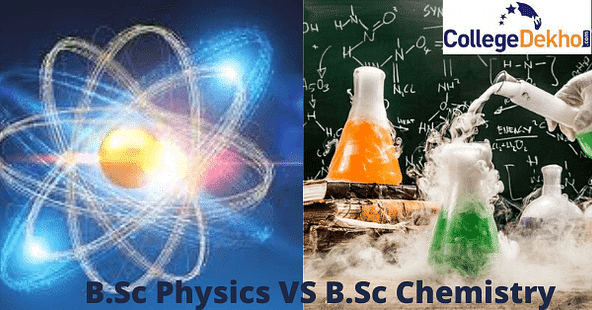Are you considering pursuing a BSc course after 12th grade but are unsure between BSc Physics and BSc Chemistry? Then look over a detailed comparison of the courses to help you choose the best one.
- About BSc Physics
- Who should Pursue BSc Physics Course?
- Reasons to Choose BSc Physics
- Average Starting Salary for BSc Physics Graduates
- About BSc Chemistry
- Who should pursue BSc Chemistry?
- Reasons to Choose BSc Chemistry Course
- Average Starting Salary for BSc Chemistry
- Hope the above information is useful and will help candidates …
- Faqs

As a student, we study all subjects of various disciplines until we complete Class X but after the completion of Class X, we have an option to choose the stream of our choice. In the same way, even after Class XII, we have an option to choose the area of study in which we are interested in. But the difficulty is that we are not too sure about the course that we must select at the graduation level. A lot of things strike in our mind while choosing a course after Class 12th like the scope of the course, career prospects and whether it will be a good decision to choose a specific course or not. When we talk about students who have studied science in Class 12 and want to pursue (Bachelor of Science) BSc course then they are usually confused between BSc Physics and BSc Chemistry as both courses are fundamental science courses and are chosen by most of the BSc students.
To help students choose the right course, we have made a comparative study between both the BSc physics and BSc chemistry which will help to choose the right course after Class 12th. Both BSc Physics and BSc Chemistry disciplines have different curriculums and have different career opportunities. The course that you must choose depends a lot on your interest in the subject and in which field you wish to move ahead in your career. If you are someone who loves to solve problems logically, have interest in Physics subjects and its core concepts, then you must choose BSc Physics. However, if you are more interested in chemistry subject and have an interest in chemical composition and structure of elements then you can choose BSc Chemistry.
Let us have a detailed understanding of BSc Physics and BSc Chemistry to understand the difference between both courses in a better way:
About BSc Physics
BSc in Physics is a theoretical and experimental course that revolves around Physics and few interdisciplinary courses like Mathematics, Chemistry and Computer Science. The program introduces modern concepts like quantum mechanics, relativity. classical mechanics, electrodynamics, electricity, magnetism, Optics and Waves. Other topics include statistical mechanics and thermodynamics.
BSc Physics programme lays a strong foundation in classical and modern physics. After completion of BSc Physics course candidates get an opportunity to conduct individual research and also gain expertise in lab work through practical sessions and field visits.
Also Read: Career Scope after BSc Physics
Who should Pursue BSc Physics Course?
Are you creative and interested in exploring old and modern concepts of Physics? Then BSc Physics is one of the good career choices for you. Good imagination and conceptual mind will help you understand the scientific phenomena in a better way. Throughout the BSc Physics, you will be involved with experiments, practicals and laboratories sessions which will help you build a strong foundation in the subjects.
Apart from interest, there are certain capabilities that you must possess to cope up with the BSc Physics syllabus. It includes quantitative reasoning and problem-solving skills. You must also be comfortable with the basic mathematics which is essential to perform calculations. Keen urge to discover new methods for problem-solving will help you build more interest in subjects' thoughts in the curriculum.
Reasons to Choose BSc Physics
It is the most fundamental course to pursue higher studies in disciplines related to Physics. Many students who have studied physics say that it helps them develop critical thinking and problem-solving skills
BSc Physics is Versatile. You can explore the existing theories and also explore new theories while studying a bachelor's course
Most physics bachelor's holders who get a job in the private sector take up engineering jobs
Majority of BSc Physics graduates become scientists, innovators, and entrepreneurs and contribute to the development of society
The programme paves a path for students to further acquire a master’s in physics in some concentrated areas. It is also an entry-level career in the government and private sectors. Various job roles that a BSc Physics candidate can opt are Research Associate, Geophysicist, Nanotechnologist, Technician, Scientist, Physicist, Lab Supervisor
Average Starting Salary for BSc Physics Graduates
Students from BSc Physics can expect an average annual package of 3.00 LPA to 5.00 LPA in private companies. However, the salary range may vary depending on the job role. Candidates can expect a high salary package after pursuing a masters course in the same discipline and with experience in the same field.
About BSc Chemistry
BSc Chemistry is a programme designed for students to acquire theoretical knowledge and practical understanding of chemistry and interdisciplinary subjects. The programme provides appropriate guidance to students to explore the chemical phenomena properties and reactivity and also perform laboratory research projects. BSc Chemistry degree is designed to give a broad understanding of the discipline after which candidates can gain expertise in a special field.
Also Read: BSc Biochemistry vs BSc Chemistry
Who should pursue BSc Chemistry?
Students who have an interest in exploring the fundamental nature of elements and composition of compounds can pursue BSc Chemistry course.
The skills required to cope up with the BSc Chemistry curriculum are a good understanding of chemical equations and evaluation skills. Candidates must be good with experiments and laboratory work. They must have patience while performing laboratory research.
Reasons to Choose BSc Chemistry Course
BSc Chemistry is the fundamental course after which candidates can go for higher education or pursue jobs in public or private sectors. After completing BSc Chemistry, candidates can opt for postgraduate studies such as MSc in Chemistry
After the completion of the course, candidates can take up job roles like Chemist, Researcher, Patent Associate, Lab Assistant
Nowadays, most industries use chemicals in everyday manufacturing like pharmaceuticals, electronic products, food packaging etc. Thus, the need for BSc chemistry graduates is always high in these industries
BSc Chemistry is a broad course. Candidates can always go for research work, advanced studies or career in related areas after the competition of course.
BSc Chemistry can also work as health care professionals as a lab assistant and also perform sample testing after appropriate training and guidance.
Average Starting Salary for BSc Chemistry
The salary range varies depending on the job role. The starting salary varies between INR 3.00 LPA to 5.00 LPA. It gets improved with add on experience or higher education in the equivalent discipline.
If you enjoy solving problems logically and are interested in Physics subjects and core concepts, then BSc Physics is the course for you. However, if you are more interested in the subject of chemistry and are interested in the chemical composition and structure of elements, you can choose BSc Chemistry.
Hope the above information is useful and will help candidates choose the most suitable course Class XII.
Are you feeling lost and unsure about what career path to take after completing 12th standard?
Say goodbye to confusion and hello to a bright future!

FAQs
You can pursue MCA after B.Sc Physics/ Chemistry. However, you must have studied Mathematics as one of the subjects in Class 12th to be eligible for the admission.
B.Sc Physics graduates can pursue some M.Tech courses like Material Science Engineering/ Nano-Technology.
You can get a job in industries that manufacture fertilizers/ seeds. You can also become a private teacher in Chemistry.
You can become a lecturer in private junior colleges or a teacher in private schools.
B.Ed is mandatory after B.Sc Physics/ Chemistry to become a government teacher.
You can either appear for the Civil Services Exam/ Indian Forest Service. You can also become a government teacher in Chemistry where you can teach Class 11th and 12th students. You will have to clear the recruitment exam.
You can get a government job with B.Sc Physics degree. Most students appear for Civil Services Exam/ Indian Forest Service. You can also become a government teacher in Physics. You will have to clear the recruitment exam.
Was this article helpful?


















Similar Articles
CUET UG 2025 Login: Application Number, Password, Steps to Retrieve
AIFSET 2025: Result (Out), Registration (Phase 3 - Started), Admission Process & Latest Updates
CUET PG Chemistry 2024 Question Paper
BSc Agriculture Placements in West India: Government Jobs, Private Sector Recruitment, Colleges and Fees
CUET 2025 Application Form Correction Window: Dates, Steps to Edit, Do's and Don'ts
IISc Bangalore Chemical Science IIT JAM Cutoff 2025 & Previous Years